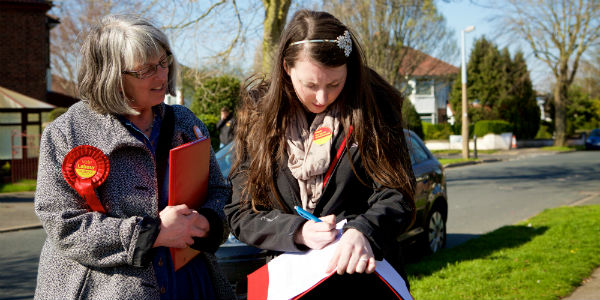Same difference? Female (and male) members of Britain’s political parties
A recent report by the Party Membership Project run by Monica Poletti, Tim Bale and Paul Webb has shown how the membership of Britain’s main political parties is more like to be male, middle aged and middle class. The results of this survey were explored in a discussion with several leading female MPs, which highlighted common concerns about party behaviours, class and gender barriers that reinforce these disparities in participation.

Labour Party activists canvassing. Picture: Labour Party, via (CC BY-NC-ND 2.0)
Six out of ten people who belong to political parties in the UK are men, although there are some pretty big differences between parties. There are also some smaller, but nonetheless significant differences between parties’ male and female members – differences we recently explored by bringing together four prominent women parliamentarians (Nicky Morgan, Kirsty Blackman, Jess Phillips, and Jo Swinson) to discuss findings from the ESRC-funded Party Members Project (PMP) run from Queen Mary University of London and Sussex University. Those findings were presented on 5 March at the London headquarters of the Social Market Foundation (SMF) think tank, with the cross-party panel of MPs invited to reflect on them in the light of their own experience as activists and elected politicians.
The PMP membership surveys (the most recent of which took place just after the 2017 general election and are summarized here) found that, although there were more male than female party members, both were more likely than not to be middle aged and middle class. When it came to ideology and policy, female members tended on balance to be more favourable to redistribution and more concerned about austerity than their male counterparts – although there are of course some notable differences between parties on this and other matters. Except when it came to the need for censorship, women tended to be more socially liberal. Women members were also keener on a softer Brexit and on the idea of a second referendum. As for campaigning, women tend more than men toward the more expressive activities, like using Facebook, rather than knocking on doors.
The PMP found that men and women joined parties for very similar reasons, although leaders appeared to be a slightly bigger draw for women, whereas more men than women saw membership as leading to a political career. That said, there was no difference in how male and female members got round to joining parties. Having joined, though, women tended to be more satisfied with what they got out of membership even if they were less likely to stand for election for and in the party. And when it came to reasons for leaving – something the PMP can explore because its survey research not only covers party members but people who’ve given up their membership – men were more likely than women to call it a day when they disagreed with the direction their party was taking; women, on the other hand, were more likely than men to do so for financial reasons.
All this seemed to strike a chord with the MPs. Women, Nicky Morgan felt, only tended to get involved if they thought their doing so would make a real difference – something which could be hard to persuade them of if a party limited members’ role in choosing leaders and helping to formulate policy. It wasn’t unusual, she added, for men to join with higher expectations about the prospects for rapid advancement and so to leave if those expectations were dashed; women on the other hand, were often prepared to play behind-the-scenes roles if they felt those roles were practically important to the running of the party.
Kirsty Blackman echoed some of these points, noting that she felt the SNP should be at an advantage in this respect because it was relatively easy for members to play a part in candidate selection and policy-making. She would, however, like more women to get involved in campaigning and suggested the key might be to better explain why some of the activities that women appeared to be less keen on were actually important – not least because activities like canvassing and leafletting were often the way people who wanted to become candidates proved their commitment. Getting more women involved in carrying out those activities, then, would probably lead to more women standing for (and winning) selection contests in the long run.
While agreeing with all this, Jess Phillips was adamant that parties needed to make a particular appeal to women members, running, for example, women-only campaign sessions to overcome some of the initial concerns some women had about such activities. She also noted that women, often because of family responsibilities, found that the traditional times canvassing and leafletting were carried out (early evenings and Saturday mornings) didn’t suit them. Partly (but only partly) because of this, women were often rather more reluctant than their male counterparts to sign up – something she navigates, when asking members if they’d be willing to volunteer, by including a ‘Maybe’ box which, she finds, women are more willing to tick (after which they get a follow-up phone call that almost always results in them saying ‘Yes’). She also made the point, though, that there were other inequalities that fed into lower participation by women at the grassroots, in particular class, especially now that fewer working-class women seem to be organised by unions than was the case in days gone by.
Jo Swinson concurred that parties simply had to do something about all this, particularly if they were concerned – as they ought to be – about female representation both in local authorities and in parliament: since grassroots members were the talent pool and the start of the pipeline, then more women needed recruiting. That means being more pro-active than they have been before: structural and cultural inequalities often meant that women were less likely than men to take the first step unless they were explicitly invited to do so. Existing female MPs and councillors had a part to play as role models but parties had to be careful, too, to bill things like introductory meet-ups in ways that didn’t unconsciously appeal more to men than women – the ‘Lib Dem pint’ evenings in a local pub being an obvious example.
In the Q&A with the audience of journalists, party officials and the odd academic, there was widespread agreement that parties might also need to re-think the definition of what being a good, hard-working activist meant, since this was in itself clearly gendered. The live issue of sexual harassment was also discussed: while it was vital to talk openly about it, people felt, it mustn’t be allowed to discourage women from joining and getting active in parties – or in other political and campaigning activity which, at least initially, doesn’t necessarily involve joining a party but might be a gateway to doing so down the line. Finally, everyone agreed that, although there was clearly a greater reluctance among women than men to become party members, we need to be careful not to implicitly blame women for not coming forward: in the end, there was a lot more parties on all sides could and should be doing to encourage their involvement.
The Party Membership Project is funded by the ESRC; the event was also funded by the PSA’s specialist group on Elections, Public Opinion and Parties (EPOP) and the Mile End Institute.
This article represents the views of the authors and not those of Democratic Audit.
About the authors
 Monica Poletti is an ESRC Postdoctoral Research Fellow at Queen Mary University of London. She holds a PhD in Political Sociology from the University of Milan/University of Mannheim, and a Master of Research in Political Communication and Research Methodologies from the University of Amsterdam. Her research interests focus on democracy, particularly political participation, electoral politics and populism.
Monica Poletti is an ESRC Postdoctoral Research Fellow at Queen Mary University of London. She holds a PhD in Political Sociology from the University of Milan/University of Mannheim, and a Master of Research in Political Communication and Research Methodologies from the University of Amsterdam. Her research interests focus on democracy, particularly political participation, electoral politics and populism.
 Tim Bale is Professor of Politics at Queen Mary University of London. His main research interests are in the fields of British and European politics. His books include: The Conservative Party from Thatcher to Cameron, The Conservatives since 1945: the Drivers of Party Change and Five Year Mission: The Labour Party under Ed Miliband. He is a trustee for Democratic Audit.
Tim Bale is Professor of Politics at Queen Mary University of London. His main research interests are in the fields of British and European politics. His books include: The Conservative Party from Thatcher to Cameron, The Conservatives since 1945: the Drivers of Party Change and Five Year Mission: The Labour Party under Ed Miliband. He is a trustee for Democratic Audit.
 Paul Webb is Professor of Politics at the University of Sussex. He has held a number of previous and visiting positions in Britain and abroad, including at the Australian National University. His research interests focus on representative democracy, particularly party and electoral politics.
Paul Webb is Professor of Politics at the University of Sussex. He has held a number of previous and visiting positions in Britain and abroad, including at the Australian National University. His research interests focus on representative democracy, particularly party and electoral politics.





 Democratic Audit's core funding is provided by the Joseph Rowntree Charitable Trust. Additional funding is provided by the London School of Economics.
Democratic Audit's core funding is provided by the Joseph Rowntree Charitable Trust. Additional funding is provided by the London School of Economics.